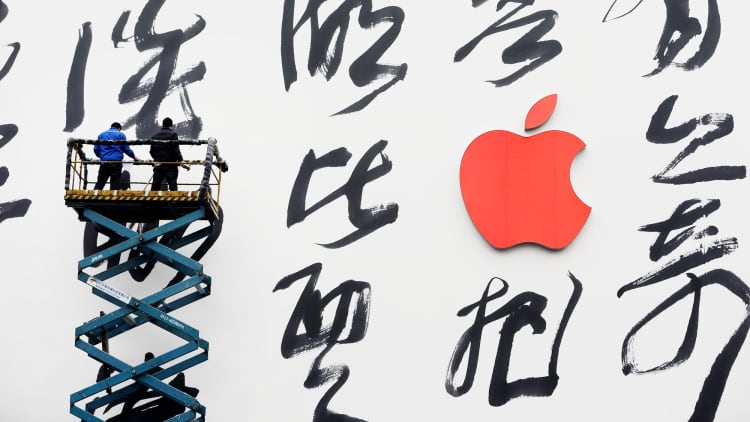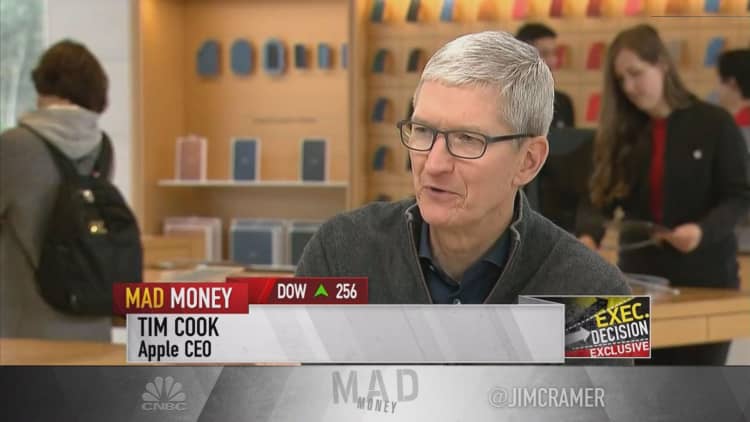As Apple struggles with sluggish iPhone sales and a falling stock price, all eyes have turned to the company's services businesses and whether they can meet the company's lofty expectations.
Apple already gave us a few hints over the last month or so. In a series of uncharacteristic partnerships with tech rivals, Apple has shown its willingness to rethink how its tightly-controlled ecosystem of software and services can expand beyond the iPhone.
The famous Apple walled garden may not be crumbling, but the cracks are starting to show.
Apple's first major partnership announcement came in November, when Amazon said it would bring Apple Music to Echo devices and let users control playback using Alexa, a competitor to Siri. Less than a year earlier, Apple made an attempt to take on the Echo with its own HomePod speaker, so quickly partnering with Amazon felt like an admission by Apple that it can't generate the kind of momentum in the home that Alexa has captured.

More questions arose this week at CES in Las Vegas, where TV makers like Sony and Vizio announced new models that work with Apple's AirPlay 2 technology, which lets you beam video from your iPhone or iPad to a TV. The TVs are also compatible with HomeKit, Apple's system for controlling smart home devices like connected light bulbs and power outlets. Until now, these features have mostly been restricted to Apple TV.
The big one came from Samsung, one of Apple's major rivals. The Korean gadget maker announced at CES on Sunday that it would bring a new iTunes app to some models of Samsung TVs, meaning you'll be able to log into your Apple account on your Samsung TV and stream movies and TV shows from your iTunes library.
These moves aren't unprecedented and certainly don't suggest impending disaster at Apple. But they do signal that the company is feeling the pressure to keep its services business growing at an impressive rate to shift the narrative from the iPhone's challenges.
Earlier this month, Apple lowered its revenue guidance, and CEO Tim Cook blamed an economic downturn in China for lackluster iPhone sales. Beyond that, he said factors like cheaper battery replacements kept users from upgrading to the latest models.
Meanwhile, Chinese retailers have already started cutting iPhone prices, and Apple has offered greater discounts if you trade in your old model. Those efforts might mitigate the drop, but it's clear the days of significant iPhone sales growth are over.
That's why Apple has shifted its focus to squeezing more money out of each existing iPhone user. The company will no longer disclose iPhone unit sales, and will instead focus on convincing customers to pony up for services like iCloud storage or Apple Music. Cook also told CNBC on Tuesday that the company will launch new services this year. (That will likely include a streaming video service based on the company's growing library of original programming and a news subscription offering through Apple News.)
But Apple's install base can only get it so far. Though the company says it has over 1 billion devices installed, many owners own multiple devices, and one subscription to an Apple service like Music or iCloud can be used on multiple gadgets at once.
So Apple needs help. Amazon's Alexa can now control Apple Music, and Samsung has convinced Apple to write an iTunes TV app based on Samsung's Tizen operating system. Those new Sony TVs run on Android, meaning you'll be able to use Siri to control Google software.
This is just the beginning. It's not a stretch to imagine the partnerships announced over the last month will extend to other platforms too, like Google Home speakers, Roku boxes and Amazon's FireTV. It's a strategy that requires Apple to sacrifice some level of control.
Think back to Netflix. Years ago, as the company was making its transition from DVDs to streaming video, it considered making its own streaming set-top box for TVs. It eventually scrapped those plans after realizing the best way to get Netflix to everyone was to make its service available on everything. The decision paid off. It's nearly impossible to find a device that doesn't support the Netflix app, and the strategy has helped it grow to nearly 140 million subscribers around the world and a $147 billion market cap.
New world
That has to be the opportunity Apple is looking at as it brings apps like iTunes to rival devices. It's not unfamiliar. In 2003, Apple launched iTunes on Windows, helping it grow into the top digital music store in the world. At the time Apple wanted to sell more iPods and, for that to happen, iTunes needed to be available on the dominant operating system.
Apple also launched Apple Music on Android a few years ago, but results are unclear. Apple Music has at least 50 million subscribers, and most of them are likely iPhone users since Apple music comes loaded on every device.
Things are different today. While there's plenty of opportunity for Apple to continue growing its services revenue through the current hardware install base, it's not going to be enough. There are dozens and dozens of smart TVs, streaming set-top boxes, and smart speakers from Apple's competitors. Amazon said this month that it's sold 100 million Alexa devices. Google touted similar growth for Google Assistant and compatible smart home gizmos.
If Apple really wants services to grow, it's walled garden might have to crack a little more.



